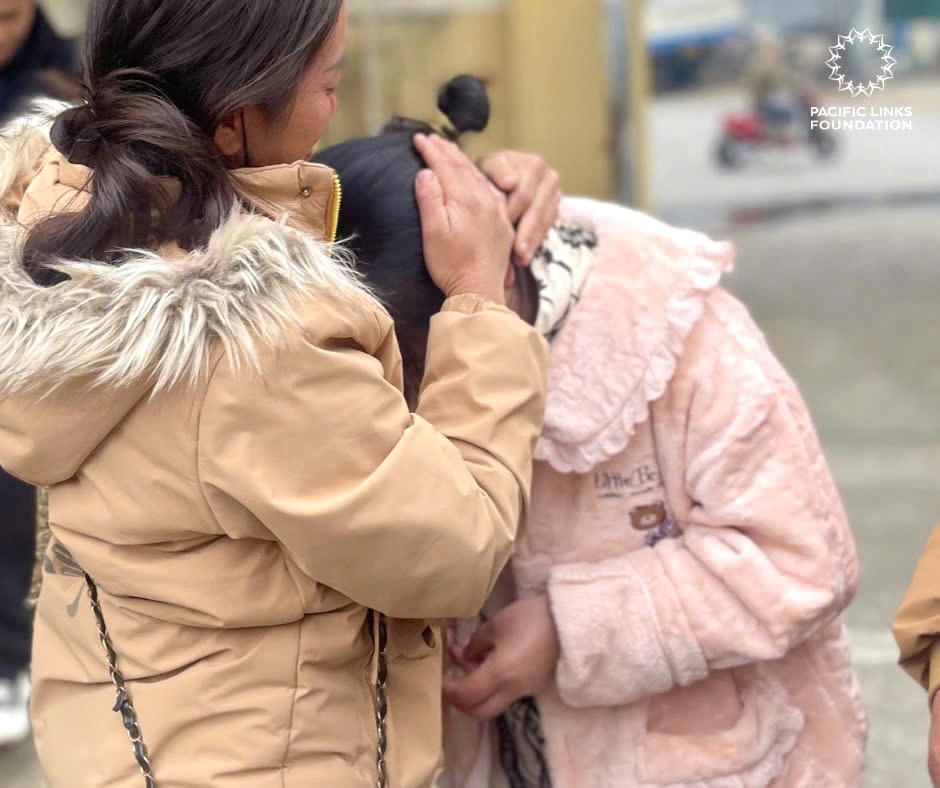There is a Pacific Links Foundation’s reintegration shelter at the northern border of Vietnam for trafficking survivors. A twenty-minute walk from the shelter will lead to a path where one can see, across the river, to China. Here, on this side of the border, the shelter girls were children, they worked in the fields with their parents, they believed the trusted family friend who said they would be paid to be dishwashers and restaurant workers and cinnamon dryers. There, on the other side of the border, they were still children when they were instead sold to be wives and prostitutes.
This is a memory I am making.
After lunch, one day, one of the Pacific Links Foundation staff members passes out the homemade yogurt she had made the night before. For most of the girls, it is the first or second time they have ever eaten yogurt. I sit squeezed between five other girls on the couch, each of us balancing our glasses on our knees. After I finish off my yogurt, I glance over to see the girl next to me dipping her spoon straight up and down into the silky yogurt. I ask her, laughing, why she’s eating in such an odd fashion, and she replies wistfully, “Because I don’t want it to be gone so quickly.” After everyone has finished up and washed their glasses, she is still licking a few drops of yogurt at a time from her spoon, relishing the sweetness.
This is a memory I am.
I spend much of my last few days at the shelter beading with the girls. We sprawl around the large conference table, loose beads scattered across the table- aqua blue and chive green and pearly white and cotton candy pink- and squint, with pursed lips, trying to stab the end of a plastic string through the tiny holes. This requires much patience, this slipping of one bead after another. We sit in a circle, and sometimes the girls sing, in Hmong or Vietnamese, their voices high and slightly off-key and haunting. Sometimes I ask them questions about their family or their villages, and they tell me about how they would play make-believe when they were younger, imagining whole meals out of mud and leaves and rocks. Sometimes, we just sit in silence, and if I look up across the table and catch a girl’s eye, smiling, she smiles widely back, and then we go back to our own beading. And in the midst of that quiet, that gentle slowing of time, there is nothing more than that moment, nothing remaining except to listen to young girls sing of love and loss, their hearts breaking in their mouths, and to bead these pearls one at a time onto a string I will carry with me always.
This is a memory.
Sitting around a circle, we share affirmations of our strengths. One of the girls remains in silence for several minutes when it comes to her turn; she can’t come up with anything positive to say about herself. Last year, she had been sold so far across the border of China that, after she escaped, she had to be flown back to Vietnam. She told me that, as she was running away from her captors, in the middle of the night, she would run close to the cliffs of the surrounding waterfalls, so that, if they found her, she could kill herself by jumping off the edge. She whispers her one positive trait to a nearby girl, but we ask her to say it aloud using her own voice. When she finally does, a barely audible, “Sometimes I try to help people,” her voice breaks, under the strain, the newness of what it means to believe that it is good in her.
This is.
A girl asks me, “Do you remember the last time you visited, one day there was a double rainbow?”
I say, “I do.”
“It was so pretty, wasn’t it?”
I agree that it was indeed. We both look out at the cloudless blue sky, her hair lit up by the sun. There is no rainbows insight, but it is still a sight to behold.
Nhu Tien Lu



